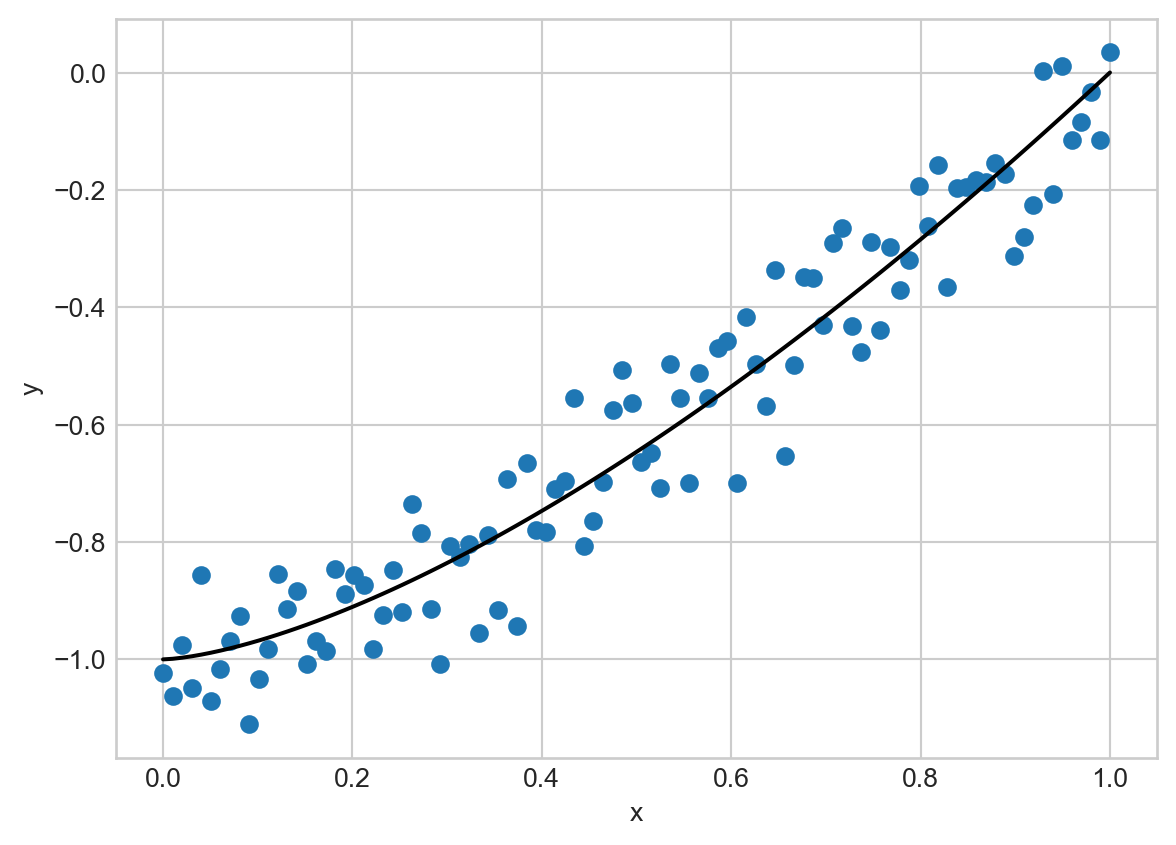Nonlinear Fitting and Convexity
Consider the nonlinear regression model in 1D in which the score for a data point \(i\) is computed according to the formula
\[
\begin{aligned}
s_i = f_{\mathbf{w},\gamma}(x_i) = w_1x_i^{\gamma} + w_0\;.
\end{aligned}
\]
If all we wanted to learn was \(\mathbf{w}\) in this model, we could use standard tools that we’ve seen previously. However, suppose that we would also like to learn \(\gamma\). Here’s an example of this model when \(\mathbf{w} = (1, -1)\) and \(\gamma = 1.5\):
Code
import torch
from matplotlib import pyplot as plt
plt.style.use('seaborn-v0_8-whitegrid')
def poly_model(X, w = torch.tensor([1, -1]), gamma = torch.tensor([1.5])):
return w[0] * X**gamma[0] + w[1]
def create_data(n = 100, w = torch.tensor([1, -1]), gamma = torch.tensor([1.5])):
"""
Create a dataset with n samples and gamma features.
"""
X = torch.linspace(0, 1, n).reshape(-1, 1)
y = poly_model(X, w, gamma) + 0.1*torch.randn(n, 1)
return X, y
X, y = create_data()
plt.scatter(X, y)
x = torch.linspace(0, 1, 100).reshape(-1, 1)
plt.plot(x, poly_model(x), color = "black", )
plt.gca().set(xlabel = "x", ylabel = "y")
To determine the optimal parameters \(\mathbf{w}\) and \(\gamma\), we’ll choose the same squared-error loss function that we used in other regression problems:
\[
\begin{aligned}
L(\mathbf{w}, \gamma) = \frac{1}{n}\sum_{i=1}^n (y_i - f_{\mathbf{w},\gamma}(x_i))^2\;.
\end{aligned}
\]
Part A
Please determine the gradient of this loss function, including the partial derivative with respect to \(\gamma\). You may find the other partial derivatives to be similar to a problem that we’ve done before.
Part B
Take the second derivative of the loss with respect to \(\gamma\), for fixed \(\mathbf{w}\). Is the loss function guaranteed to be convex? If yes, explain. If not, give an example setting of \(\mathbf{w}\), \(\mathbf{X}\), and \(\mathbf{y}\) such that the second derivative is negative.
Hint: It’s sufficient to choose a data set \(\mathbf{X}\) and \(\mathbf{y}\) containing a single point.
© Phil Chodrow, 2025
